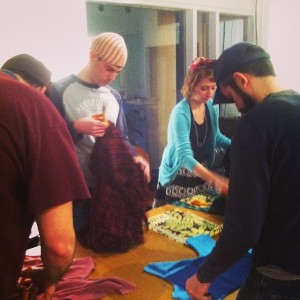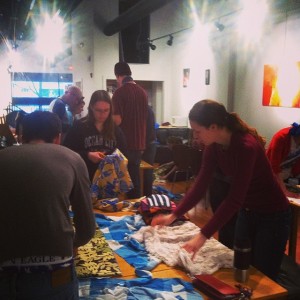 Today we wrap up our 4 week series entitled Circle Maker. Talking about praying circles around our biggest dream and greatest fears.
Today we wrap up our 4 week series entitled Circle Maker. Talking about praying circles around our biggest dream and greatest fears.
Just to sum up quickly. The first week we talked about the legend of the Circle Maker named Honi and how he climbed into a circle that he drew, and prayed until it rained. We also talked about Jericho and how we all face our Jerichos. Those huge things God may be calling us to face and pray for. And to see that if they come to fruition that it was because of him and not our strength or wisdom or “battle plan.”
Two weeks ago we talked about Dreaming Big. We talked about risk, dreaming big dreams, and how the Kingdom of God is about risk and praying that God would come through in a big way. We talked about how in God’s Math 0 + 0 is actually not zero but 105 million. 105 million quail. We also talked about how we all see God come through in his provisions and how easy it is to forget and complain.
Last week we talked about Praying Hard and talked about the perseverance needed to pray through and continue to pray. And that a huge part of success is persistence. Not that if we just keep asking God he will give us what we want. God is more concerned with the process of what we are becoming, instead of the answer, that we focus on.
This week we are going to be talking about Thinking long and not giving up.
First let me tell you about a story of thinking long and envisioning the future.
On the Swedish Island of Visingso, there is a mysterious forest of oak trees; mysterious because oak trees aren’t indigenous to the island and its origin was unknown for more than a century. Then in 1980, the Swedish Navy received a letter from the Forestry Department reporting that their requested ship lumber was ready. The Navy didn’t even know it had ordered any lumber. After a little historical research, it was discovered that in 1829 the Swedish parliament, recognizing that it takes oak trees one hundred and fifty years to mature and anticipating a shortage of lumber at the turn of the 21st century, ordered that twenty thousand oak trees be planted on Visingso and protected for the Navy.
That is thinking long.
For the record, the lone objector was the Bishop of Strangnas. He didn’t doubt that there would still be wars to fight at the end of the twentieth century. He was the only one who anticipated that ships might be built of other materials by then.
If we are to be a circle maker we need to think long, not just in dreaming, visioning, and taking risks, but especially in prayer. If those dreams that God has birthed within your heart, the vision that if it comes to fruition, that it can only be from God, the big hairy audacious goals that you have, it means that you need to pray long and pray hard and also think and dream in the long term.
There is a brief story in the Old Testament in which we see someone who prayed, was persistent, and didn’t give up on his prayers. This person was Daniel and the his prayer story is found in Daniel 10:12-13.
Daniel 10:12-13 says, Then he continued, “Do not be afraid, Daniel. Since the first day that you set your mind to gain understanding and to humble yourself before your God, your words were heard, and I have come in response to them. But the prince of the Persian kingdom resisted me twenty-one days. Then Michael, one of the chief princes, came to help me, because I was detained there with the king of Persia.”
Let’s unpack these two verses a little bit to see what it might say to us about being circle makers and thinking long.
The first thing that we need to look at is the first 4 words in the first verse, Do not be afraid. Now if we look at the verses 5-6 we see who is saying these words to Daniel, “I looked up and there before me was a man dressed in linen, with a belt of fine gold from Uphaz around his waist. His body was like topaz, his face like lightning, his eyes like flaming torches, his arms and legs like the gleam of burnished bronze, and his voice like the sound of a multitude.” Now commentators and theologians are divided on who this man is. Some commentators believe this to be a theophany, which is Jesus showing up in the Old Testament. These commentators compare this description of the man with the description of Jesus in Revelation 1:12-16. Other theologians and commentators look to this man as an angel, possibly what we might call a high ranking angel. But whatever the case may be, whenever a heavenly being appears to humans, the first response to humanity is usually don’t be afraid. Probably it is also the first thing we need to hear when God puts some vision, dream, or hairy audacious goal in our hearts. Do not be afraid. Take the risk. Or as Robin Williams said in that great movie Dead Poets Society, Carpe Diem boys. Seize the day. Don’t be afraid and drop to your knees and begin to go to God in prayer regularly, often, and however long it takes. Often our greatest fears are wrapped up in our biggest dreams. And we need to hear God’s word to us, Don’t be afraid. We need to internalize his words to us. Don’t be afraid. And we need to take the fear that comes from seeking out our biggest dreams, and use that as motivation to drive us to our knees in prayer. Not just once, not just for a week, but often, regularly, and persistently.
We see that Daniel understood that God would come through in some way. He just needed to be faithful, and seek God’s face. After all, God heard him from the day that he began to pray and lift his requests to God. God responded to Daniel’s prayer the very moment he made his request known. Daniel had been in great and serious prayer for 3 weeks. He didn’t give up but continued praying. An angel was dispatched because of Daniel’s prayers. This is another of many reminders in the book of Daniel that prayer truly matters. It isn’t merely a therapeutic exercise for the one who prayers. Prayer changes things and it changes us as well.
We see that the angel or Jesus contended with the Prince of Persia, for 21 days. The exact amount of time that Daniel was in serious prayer and mourning as spelled out in Daniel 10:2, “At that time I, Daniel, mourned for three weeks.” The correlation between Daniel’s time of self-denial and prayer and the duration of the battle between the angel and the prince of the Kingdom of Persia establishes a link between Daniel’s prayer and the angelic victory. Since the angelic victory came on the 21st day we can surmise that if Daniel quit praying on the 20th day, the answer may not have come. What if he had stopped praying? What if he thought God wasn’t coming through? What if he gave up? I truly believe that some of our biggest breakthroughs happen right after some of our great setbacks and disappointments. We just need the strength to get through them. It is like this cartoon. If the man would just have continued to dig for a little bit more, the diamonds would have come spilling out. But he gave up right before his big break through. I believe it is no different than with us and with our prayer life. We need to persevere in our prayers, especially if we are thinking in the long term and in the big Kingdom picture. I believe the bigger the dream, the more audacious the goal, the harder and longer you need to pray. It might be 21 days, a year, or it might take your entire life.
But just like the Israelites who circled Jericho or Elijah who got down on his knees and prayed for rain, or Honi the Circle Maker who drew a circle in the sand and wouldn’t leave until it began to rain, you need to think long and pray long. because if you stop praying before the break through you might forfeit the miracle. The question that I wonder about is why the 21 day delay for God to come through on Daniel’s prayer? Why did God allow such a conflict? He certainly could have blasted away in a moment any demonic opposition. God’s plan probably was to use the time of delay to develop Daniel as a man of persistent prayer. This persistence in prayer that Daniel had, and what we talked about last week in relation to the Parable of the Persistent Widow, is not necessarily because of God’s reluctance and that his reluctance needs to be overcome. It is more about us. It is more about our necessarily in training. We talked about it last week that we are all to often looking for the answer, the end result, while I truly believe God is more interested in the process, the refining, the training, and what we are becoming.
Daniel’s success makes us reflect on our failures. How much angelic assistance or insight has never been realized, or greatly delayed because of our lack of persistence in prayer?
Drawing prayer circles is a lot like climbing a mountain. The dream or promise or miracle may seem impossible, but if you keep circling, anything is possible. With each prayer, there is a small change in elevation. With each prayer, you are one step closer to the answer. And the harder the climb, the sweeter the summit. The same is true with prayer. The more you have to circle something in prayer, the more satisfying it is spiritually. And, often, the more glory God gets.
Too often we approach prayer in an ASAP fashion. We want God to answer our prayers as soon as possible. We need a paradigm shift. We need to be willing to pray for as long as it takes. Pray that it will take long enough and be hard enough for God to receive all of the glory. Don’t look for the path of least resistance. Look for the path of greatest glory. And that requires high-degree-of-difficulty prayers and lots of circling.
Very rarely does our first prayer request hit the bulls-eye of God’s good, pleasing, and perfect will. Most prayer requests have to be refined. Even “the prayer that saved a generation” didn’t hit the bulls-eye the first time. Honi refined his request twice: “Not for such rain have I prayed.” He wasn’t satisfied with a sprinkle or torrential downpour. It took three attempts to spell out exactly what he wanted: “the rain of Your favor, blessing, and graciousness.” Honi drew a circle in the sand. Then he drew a circle within a circle within a circle.
What promises or miracles or dreams are you willing to pray for as long as it takes? After all, some dreams should be so big that they take a lifetime to fulfill.
Let’s unpack this question together but then let’s begin to apply the message right away and spend some time in prayer together. Let’s not just talk about prayer, let’s actually pray together.
1. What big dreams or greatest fears are you circling in prayer? What promises or miracles or dreams are you willing to pray for as long as it takes?
2. What is God saying to you and what are you going to do about it? What is God saying to us and what should we do about it?
3. Gather together with 3-5 other people, share what you are circling in prayer, and spend time in prayer together.










